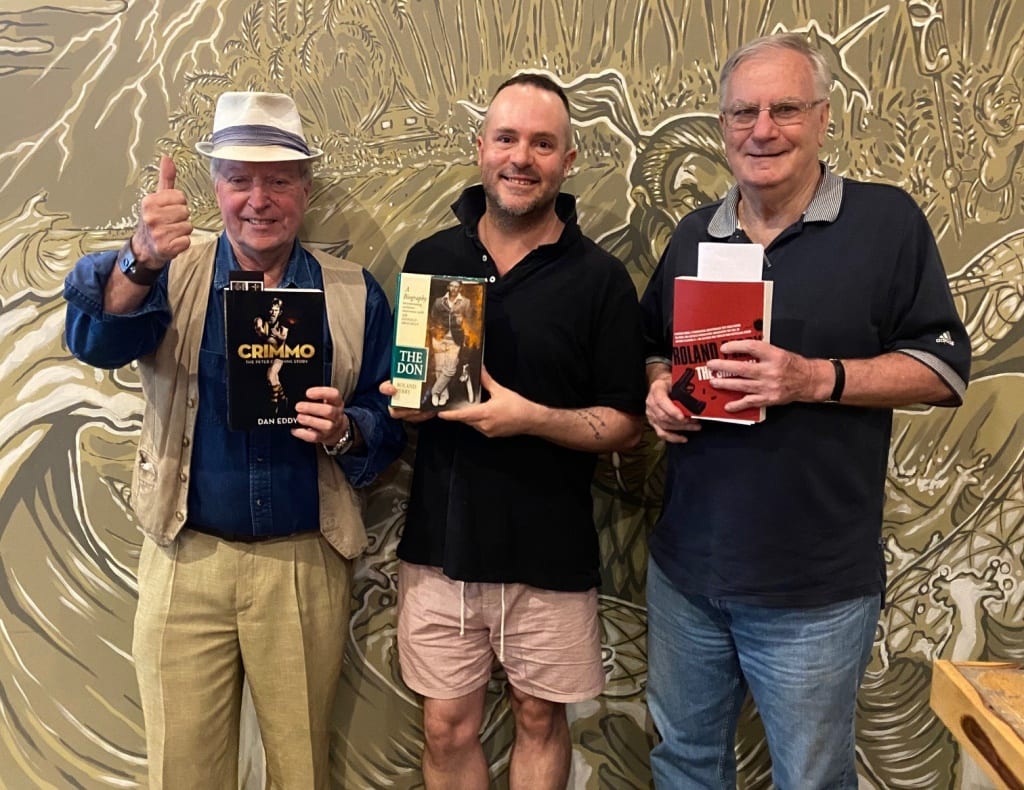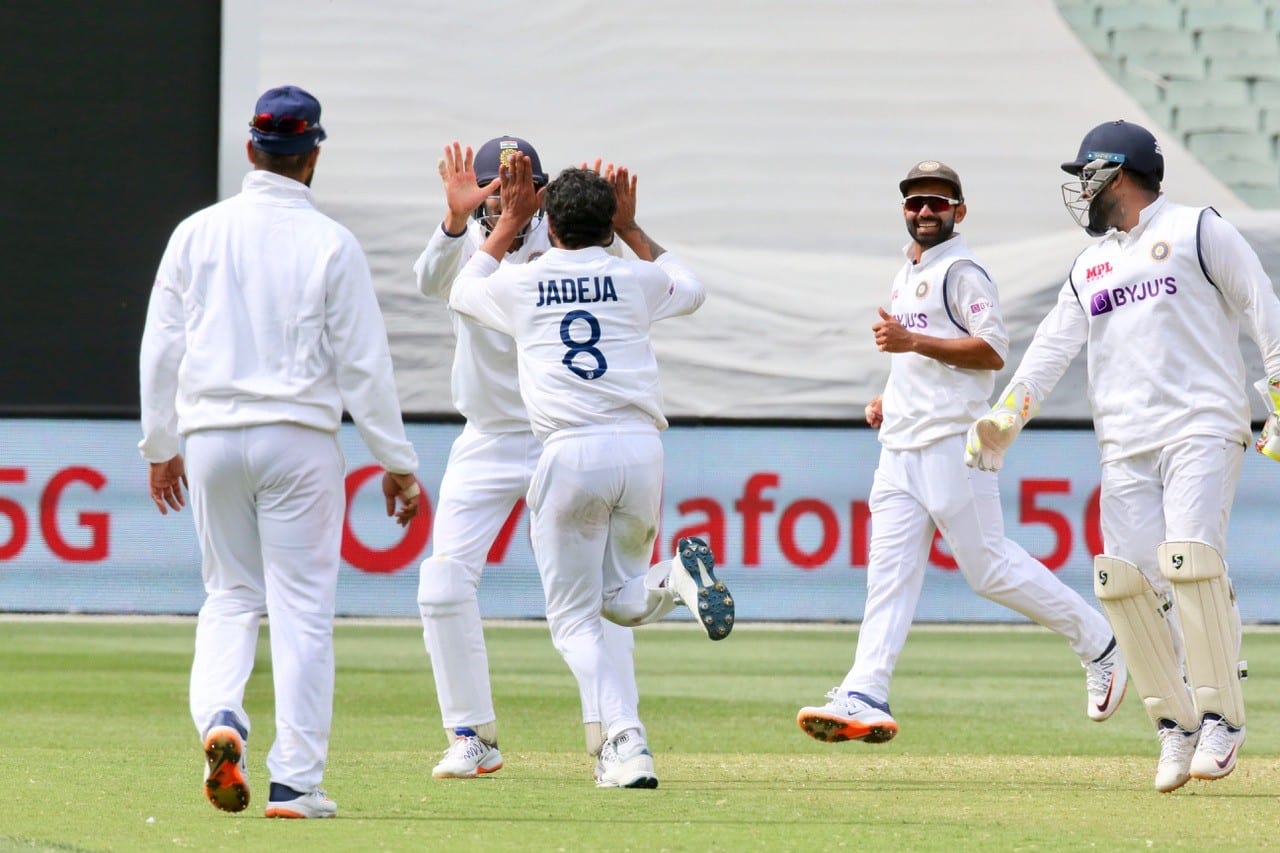SPEND your life watching enough sport and you end up with a few stories to tell, writes RON REED:
ENJOYED a drink the other night with two very accomplished wordsmiths. Roland Perry is high on the list of Australia’s most prolific and best selling authors, his new novel, The Shaman, his 38th book on all manner of subjects, many of them to do with cricket and Don Bradman in particular. Dan Eddy is rapidly acquiring a reputation as Australia’s leading sports author, having written or co-written a dozen excellent books about football, the most recent an acclaimed 500-page biography of the late Peter Crimmins, the Hawthorn captain who died of cancer at the peak of his career in the 70s.
In this busy and accomplished company, I was just making up the numbers. But I was able to agree with them that the day any book is published is a red-letter one for the writer because, however good or ordinary the result may be, it is usually the culmination of a lot of hard work, often spread over months if not years.
Last Monday was – for the seventh time – such a day for me, with Wilkinson Publishing releasing WAR GAMES: A Father & Son Memoir of War and Sport. Perry and Eddy have been among the first to read advance copies and have been generous in their feedback, so of course I must now return the compliment by declaring them to be very wise men blessed with good judgment. Then again, they’re my friends so they would say such things, wouldn’t they?

So what are these 240 pages all about?
Hmmm, there’s not really a simple answer to that. It’s loosely based on my life and times – half a century earning a living as a daily newspaper sports journalist, much of it spent travelling the world in search of great moments in major events and getting to know the people who provide them – but I wouldn’t really call it an autobiography. These are essentially other people’s stories. I’m just an onlooker, a recorder, an appreciator – a fan with a front-row seat, really.
But … war? Well, the older I’ve become the more I’ve felt the need to tell one particular story that has nothing to do with sport. The central figure in this is my father Bill Reed, who spent most of the second world war as a prisoner of the Japanese and lived to tell the tale – amazingly. After being torpedoed at sea, he and 24 mates survived the atomic bombing of Nagasaki that brought the war to an abrupt end while tens of thousands perished around them. Forty years later he returned to Nagasaki to make his peace with the Japanese, visiting the one and only old foe who had shown humanity and kindness in his long incarceration.
Like many old soldiers, he didn’t talk much about his experiences while I was growing up, but eventually set out to write it all down – only to die during heart surgery with his journal far from complete, but compelling in its content anyway. So I have done my best to assemble the rest of his story for posterity, describing what it was like to be in the middle of what is still the only nuclear attack by one country on another in history – and to walk away.
Like father, like son, perhaps – I was also extremely lucky not to be killed by a bomb – not as a prisoner of war, but as a reporter waiting for a cricket tournament to start in the midst of a civil war in Sri Lanka. A hundred other people died – half an hour later, I would have been one of them.

What else?
Well, I was told when I set out that sportswriting was the toy shop of newspapers, which might be true insomuch as I had a lot of fun, while meeting a lot of interesting characters and witnessing many memorable events.
SHANE Warne was more compelling to watch and write about than any other Australian sportsman or woman of my time but it wasn’t without its flammable moments – a cricket official locked us up in a dressing room before a Test match one time, to sort out our differences. Warnie has since invited me home to explain at length why he and the media took so long to become as comfortable with each other as they now are, which might be instructive to other young sportsmen who find themselves thrust into the spotlight before they’re quite ready.
NOBODY died when John Bertrand’s multi-million dollar boat – the last word in racing yacht design – sunk without trace off San Diego, but it was one of the most unforgettable and expensive disasters in Australian sport, the death knell for this country’s fascination with the America’s Cup. From inside the military-like campaign compound, I watched as this charismatic leader of men refused to concede defeat while Australia applauded from afar.
LIKE most fans of the Carlton Football Club in its last great golden era, I wished there were two of champion player Alex Jesaulenko – and then one day I discovered there was. When he was told a brother his elderly mother had given up for lost in a wartime prison camp had surfaced and was looking for his family, I had one of the best front-page human interest stories footy had ever thrown up.
CELEBRATED Carlton footy coach David Parkin has revealed what his equally famous counterpart Tom Hafey, then with Collingwood, said to him about his own star players after the Blues won the 1982 Grand Final. It might have been a long time ago, but there are going to be a few old Magpies with very red faces when this becomes common knowledge.
FOR nine decades it’s been the biggest mystery in Australian sport – what brought about the premature death of Australia’s greatest racehorse, Phar Lap? In Tijuana, Mexico, where Big Red ran and won his last race, I met one of the few living witnesses – and he was convinced he knew what then happened.
ABORIGINAL jockey Darby McCarthy was one of the finest horsemen Australia has produced – until his colourful career was derailed by a disqualification for a riding offence he swore he did not commit. Many years later, after listening to his ultimately sad life story at his home in rural Queensland, I was able to help persuade the racing authorities to formally pardon him so that he could go to his dream-time an innocent man, which he did last year.
INSIDE and outside the ring you meet all sorts at the fights – “underworld identities,” as the newspapers refer to them, are certainly no exception, which is why the infamous Mick Gatto entered my orbit. But at least I wasn’t shot dead at the door – not everybody was so lucky. And then there was the mysterious Russian used car salesman who lobbed unannounced in Las Vegas and started asking who we all were.
HE was, and remains, one of the three or four greatest road and track cyclists Australia has ever produced, but Stuart O’Grady’s stupendous career ended sadly and controversially when he admitted to having once experimented with performance-enhancing drugs as a naïve newcomer to the big-time. His anguish at what he insists was a one-off mistake suggests the sports doping issue should not, perhaps, be as totally inflexible as it is.
CATHY Freeman was undoubtedly the star of the Sydney Olympics – but the gold medal won by cyclists Scott McGrory and Brett Aitken in life-and-death circumstances might have been even more worthy of the Bill Roycroft Medal – if there was such an award, which there should be.
THE late Peter Norman’s role in the famous Black Power salute at the Mexico City Olympics has become better known in recent years but the physical and mental agony he endured years later for completely different reasons was a private hell until he opened his heart to me about it, giving birth to a valued friendship.
HOW did Jon Sieben, a complete unknown in international and even Australian sport, a 17 year old surfie from the Queensland beaches – dethrone one of the world’s most successful and intimidating swimmers in an Olympic upset for the ages? What went on behind the scenes?
SPORTS journalism is a highly coveted way to earn a living – or is it? Not so much anymore, perhaps. Why would that be?
All this and more forms a diverse and colourful narrative, I hope, in WAR GAMES, available now at wilkinsonpublishing.com.au, Booktopia, Amazon and good bookshops, RRP $29.95.
RON REED has spent more than 50 years as a sportswriter or sports editor, mainly at The Herald and Herald Sun. He has covered just about every sport at local, national and international level, including multiple assignments at the Olympic and Commonwealth games, cricket tours, the Tour de France, America’s Cup yachting, tennis and golf majors and world title fights.



Discussion about this post